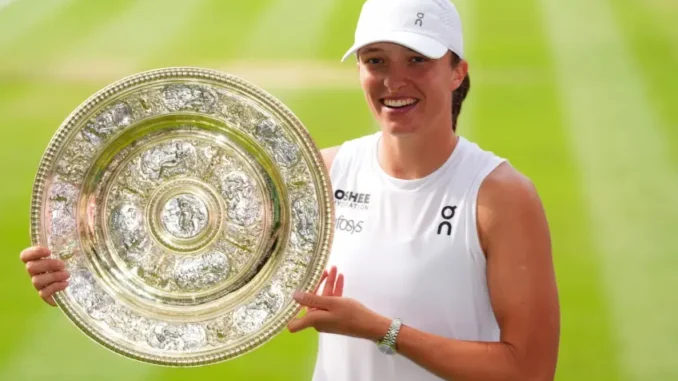
On July 12, 2025, Iga Swiatek etched her name into tennis history with a stunning 6-0, 6-0 victory over Amanda Anisimova in the Wimbledon women’s final, clinching her first title on the hallowed grass courts of the All England Club. The 24-year-old Polish star, already a celebrated champion with four French Open titles and a 2022 US Open crown, delivered a performance of unparalleled dominance, becoming the first woman since 1911 to win a Wimbledon final without dropping a game. This triumph, her sixth Grand Slam title, marked a significant milestone, as Swiatek became the youngest woman since Serena Williams in 2002 to win majors on all three surfaces—clay, grass, and hard courts. Reflecting on her journey, Swiatek shared why her Wimbledon and US Open victories hold a special place in her heart, revealing a deeply personal connection to these unexpected triumphs.
Swiatek’s dominance on clay, where she earned the moniker “Queen of Clay” with four Roland Garros titles between 2020 and 2024, has long defined her career. Her heavy topspin forehand and relentless court coverage made her a force on the red dirt, where she lost no more than five games in any singles match during her 2020 French Open run. Yet, grass and hard courts posed unique challenges, with their faster pace and lower bounce testing her adaptability. “I’m not gonna rank them. I have so much respect to the other tournaments. I worked really hard to win all the other Slams,” Swiatek said after her Wimbledon victory. “But this one and the US Open feel better because no one expected that. It wasn’t a relief. It was more of just good tennis and working to make it happen without this baggage on your shoulders.” Her words capture the exhilaration of defying expectations on surfaces where her success was less assured.
The 2025 Wimbledon run was a testament to Swiatek’s evolution. Historically, grass had been her kryptonite, with only one prior second-week appearance at the All England Club—a quarterfinal in 2023. Her 2018 junior Wimbledon title hinted at potential, but as a professional, she struggled to translate her clay-court prowess to the slick lawns. This year, however, everything clicked. After a semifinal loss to Aryna Sabalenka at the French Open, Swiatek took advantage of the extended preparation time, training on grass in Mallorca and competing at Bad Homburg, where she reached her first grass-court final, falling to Jessica Pegula in a tearful defeat. “I feel like I have developed as a player and I had time to practise a little bit more,” she noted, crediting her work with new coach Wim Fissette, who replaced Tomasz Wiktorowski late in 2024. Fissette’s focus on her movement and serve—evidenced by her 79% first-serve point win rate at Wimbledon—unlocked her grass-court potential.
Swiatek’s US Open title in 2022, where she defeated Ons Jabeur in the final, similarly carried an element of surprise. Hard courts, while more familiar than grass, demanded a different rhythm from her clay-court game. Her 37-match winning streak that year, which included six titles, culminated in New York, where she navigated a competitive field to claim her first hard-court major. “Honestly, I didn’t even dream [of this] because for me it was just way too far,” Swiatek said of her Wimbledon triumph, a sentiment that echoed her US Open victory. The lack of overwhelming pressure, unlike the sky-high expectations at Roland Garros, allowed her to play with a “new freshness,” as former player Andrea Petkovic observed during Swiatek’s Bad Homburg campaign. “For most of this year you could sense pressure and tension when she stepped on court. In Bad Homburg you could see that was gone,” Petkovic remarked.
The past year tested Swiatek’s resilience. A doping controversy in November 2024, resulting in a one-month ban after a positive test for trimetazidine due to contaminated medication, weighed heavily, as did the passing of her grandfather and a title drought that saw her ranking slip to No. 8. “Obviously, in the back of my mind, I had this thing,” she admitted, referring to the doping case she kept private from friends in Warsaw. Yet, her Wimbledon triumph was a cathartic release, a “good therapy session,” as she jokingly described her post-match press conference. “The lesson is just that even when you feel like you’re not on a good path, you can always get back to it if you put enough effort and you have good people around you,” she said, crediting her team and family.
Swiatek’s 57-minute demolition of Anisimova, who struggled with nerves and 28 unforced errors, underscored her mental and physical dominance. “She’s an unbelievable player,” Anisimova acknowledged, reflecting on Swiatek’s relentless pressure. With this victory, Swiatek joined an elite group as the eighth woman in the Open Era to win majors on all three surfaces, trailing only Venus Williams among active players with her six titles. As she hoarded Wimbledon’s iconic towels—a quirky habit that endeared her to fans—she stood on the Centre Court balcony, Venus Rosewater Dish in hand, embodying a player who had conquered not just grass but her own doubts. With the US Open on the horizon, Swiatek’s journey suggests she’s far from done surprising the tennis world.
Leave a Reply